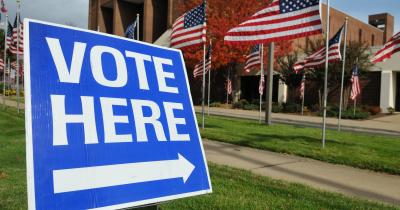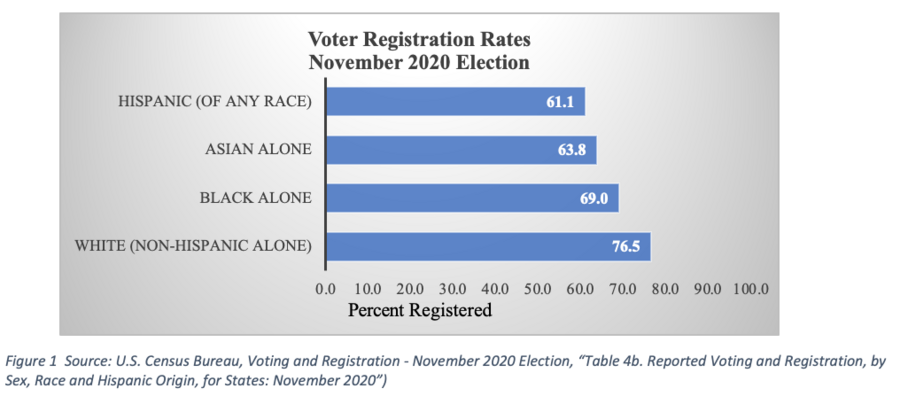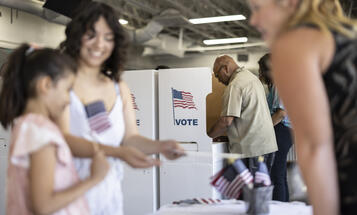
The Moment is Now for Federal Agencies to Improve Access to Voter Registration
President Biden's Executive Order on Promoting Access to Voting requires federal agencies to submit plans to the White House on how they can promote voter registration for eligible persons they serve.

We are approaching an important milestone in the White House’s effort to use its executive power to broaden access to voting.
While all eyes are on the looming showdown in Congress over crucial legislation to protect the right to vote, we are also approaching an important milestone in the White House’s effort to use its executive power to broaden access to voting. After a 2020 campaign season fraught with challenges to the right to vote, the Biden administration moved to leverage the power of the federal government to protect this fundamental right with its March 7th (“Bloody Sunday”) Executive Order Promoting Access to Voting. Previously, Demos shared details about the tremendous potential this EO holds, given the importance of voter registration as the gateway to voter access. Demos has been hard at work since then, leveraging our 15+ years of experience implementing voter registration at state agencies to encourage the administration and key federal agencies to realize that potential.
Of most interest today, this Executive Order requires federal agencies to submit plans to the White House within 200 days (by September 23, 2021) on how they can promote voter registration for eligible persons they serve. The need for robust federal agency plans is as urgent as ever. State legislatures across the country have targeted the voter registration process with over 50 bills that would make it harder for voters to register. From poll taxes to targeted voter purges, restrictive voter registration policies have long been used as a tool to prevent Black, brown, Indigenous, and low-income communities from participating in elections. This year’s bills could further exacerbate the racialized and income-based gaps in voter registration rates that are the result of this intentional exclusion. And they heighten the imperative for federal agencies to adopt policies that will make voter registration more accessible, and, in turn, help build a more equitable and racially just democracy.
While this week’s deadline is only an initial benchmark in the significant project of bringing voter registration to federal agencies, it marks an important moment to check in on the work of the last 6 months—and on what we should demand in the plans agencies put together.
Since March 7th, Demos has been working closely with our partners at the ACLU to ensure strong implementation of the EO. We have identified key programs where integration of registration services could have a significant impact in closing registration gaps, such as naturalization ceremonies, low-income housing programs, Indian Health Services, programs serving veterans, and more. We have developed resources for agencies on how to effectively integrate voter registration services into current programs, including why and how to do voter registration at federal agencies and best practices for agency registration, among others. We are partnering with organizations across issue areas, to support their own engagement with the agencies in this important work. And we are working with grassroots partners to encourage states to request designation of federal agencies as voter registration sites under the NVRA, an additional opportunity created by the EO.
Integrating voter registration into routine transactions with federal agencies has the potential to add millions of eligible voters to the registration rolls.
It will take time for federal agencies to fully implement their voter registration plans, and for advocates and the public to assess the efficacy of those efforts. However, on the eve of the plan submission deadline, it’s important to take note of how this EO creates an opportunity for the federal government to shepherd its significant resources to advance voter registration across the United States. Federal agencies provide services to millions of Americans, including many Black, brown, and Indigenous Americans. Integrating voter registration into routine transactions with federal agencies has the potential to add millions of eligible voters to the registration rolls—a vital step towards dismantling white supremacy in our democracy and building a more representative government.
Finally, while executive action is a necessary step, it is by no means a substitute for federal legislation to establish lasting voting rights protections and prevent future voter suppression, such as the Freedom to Vote Act, the John Lewis Voting Rights Advancement Act, D.C. Statehood, and the Native American Voting Rights Act. Action by the administration and by Congress is necessary to fight the racially exclusionary voter suppression efforts that too many states have enacted.





